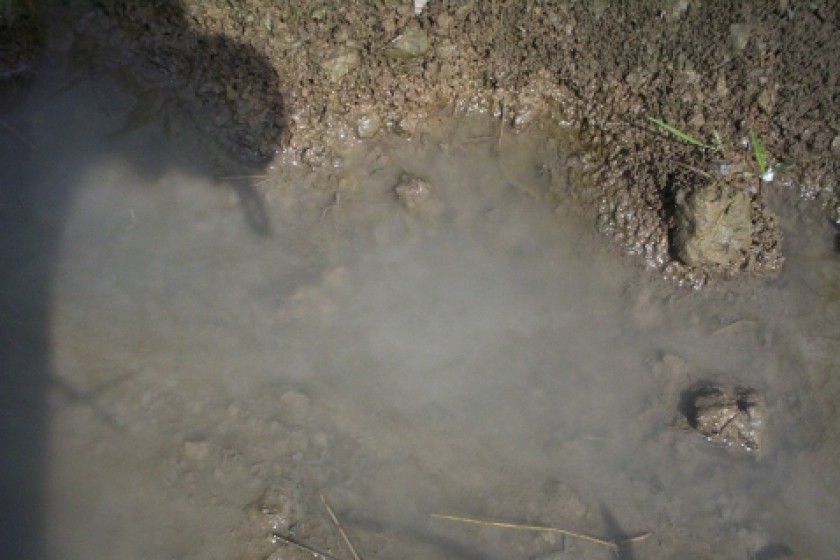
What Causes the Waters of the Debed River to Turn White?
The peach fields of the Noyemberyan district yielded up to 30 tons of crops during the Soviet years. So much so that neighboring village residents and groups of schoolchildren pitched in to help the fruit growers in the Debed valley harvest it all. Still, some of the bountiful crop wasted away, unpicked on the trees. The sun-drenched fruit grown in Noyemberyan was exported to other Soviet countries by air and train transport.
A portion of the harvest was also turned into preserves at the Ayrum reprocessing plant.
During the 1990’s, due to the energy crunch in Armenia, the irrigation pumping station in Ayrum, went into disuse and the vast majority of fruit fields dried up. In 2000, with the assistance of the International Fund for Agricultural Development (IFAD), work began to restore the local peach orchards. In 2005, an irrigation canal, starting from the Ayrum hydroelectric station, was put into operation. The canal distributes water to some 1,000 hectares of land on a gravity-based system, without the use of any pumps. As a result, today some 400 hectares of peach orchards are producing fruit. The crop this year was bountiful. The Ayrum reprocessing plant has also restarted operations after so many idle years as well. The plant has a new owner also, Sergey Karapetyan, who has pumped some $2 million into the operation. Two assembly lines in the plant have been restarted and the plant now has the capacity to reprocess some 200 tons of fruit per day.
Mr. Karapetyan claims that this year the plant can handle some 1,500 - 2,000 tons of peach crop. He also states that the concern will assist the villagers in the future with credit schemes. He goes on to claim that in two and a half years the Ayrum canning facility will be just as renovated and up to date as the canning plant in Artashat.
The canning plant has already begun to take in crop and reprocess it. Thus, it would seem that the problems once faced by fruit growers in Noyemberyan were behind them and that the Debed Valley and found its long-term development scenario.
The growers, however, are ill at ease. Gegham Djilavyan, a grower from Ptghavan, complains that the Debed River turns a shade of white in the mornings. This flow of whitish water usually begins in the night and continues till about 11 A.M.
The growers claim that their peach trees start to dry up after being irrigated with this dirty Debed River water. Spartak Zakaryan, President of the Noyemberyan Growers’ Union, states that watermelon plantings have dried up due to the whitish water.
Local growers testify that such occurrences happened last year as well but that incidents of the river being polluted are much more frequent now. The growers suspect that the Debed is being polluted by heavy metals from the Alaverdi copper smelter facility or by the Akhtala Mountain Enrichment Complex.
The growers voiced their concerns to Aramayis Grigoryan, the Minister of Agriculture, who visited the fruit orchards in question on July 29th. On August 22nd, Armen Gevorgyan, Minister of Territorial Administration and ROA Deputy Prime Minister, traveled to the Ptghavan fruit fields. It was 3 P.M. when the Deputy PM finally made it to the fields and on that day the whitish flow of the Debed River was particularly long-lived. The Deputy PM was thus able to see the cloudy state of the river with his own eyes.
In response to our question regarding the pollution of the river the Deputy PM Gevorgyan replied that, “Two days ago a work order was forwarded to the Ministry of Agriculture. The Ministry has taken water samples from the rivers which are being analyzed in Yerevan. I’ve also worked out an agreement with the Ministry of Nature Protection (MNP) whereby it will assume long-term monitoring of discharges by factories located along the river’s length. It is vital to evaluate the degree of pollution in the river. If it turns out that pollution levels exceed acceptable norms appropriate measures must be implemented to remove the underlying causes of the pollution. I believe that we will come up with a solution to the problem in a very short time.”
Fruit growers of Noyemberyan believe that the whitish coloration of the Debed River stems from the tin wastes discharged by factories in the Lori Marz. After each watering of the fruit fields the trunks of the trees harden and become “cement-like”. The only consolation of the growers is that fish species in the river haven’t been totally decimated. Thus, they deduce that water pollution levels haven’t reached fatal levels. Shortly, however, the multi-metal mining operation in Teghut will start up along with its huge tailings dam. This will pose a major threat to the ecology of the Debed River. Furthermore, water from the Debed isn’t only utilized for irrigation purposes. There are numerous residential settlements along its length in the Lori and Tavush Marzes. During the oppressive summer heat local children swim in the river and villagers bring their animals to its banks to drink. Residents of the communities of Ayrum, Haghtanak and Ptghavan also draw drinking water from wells dug into the banks of the Debed. The river water is cleansed through layers of sand but just how much of the heavy metals are filtered out is anybody’s guess.
 Videos
Videos Photos
Photos
Write a comment